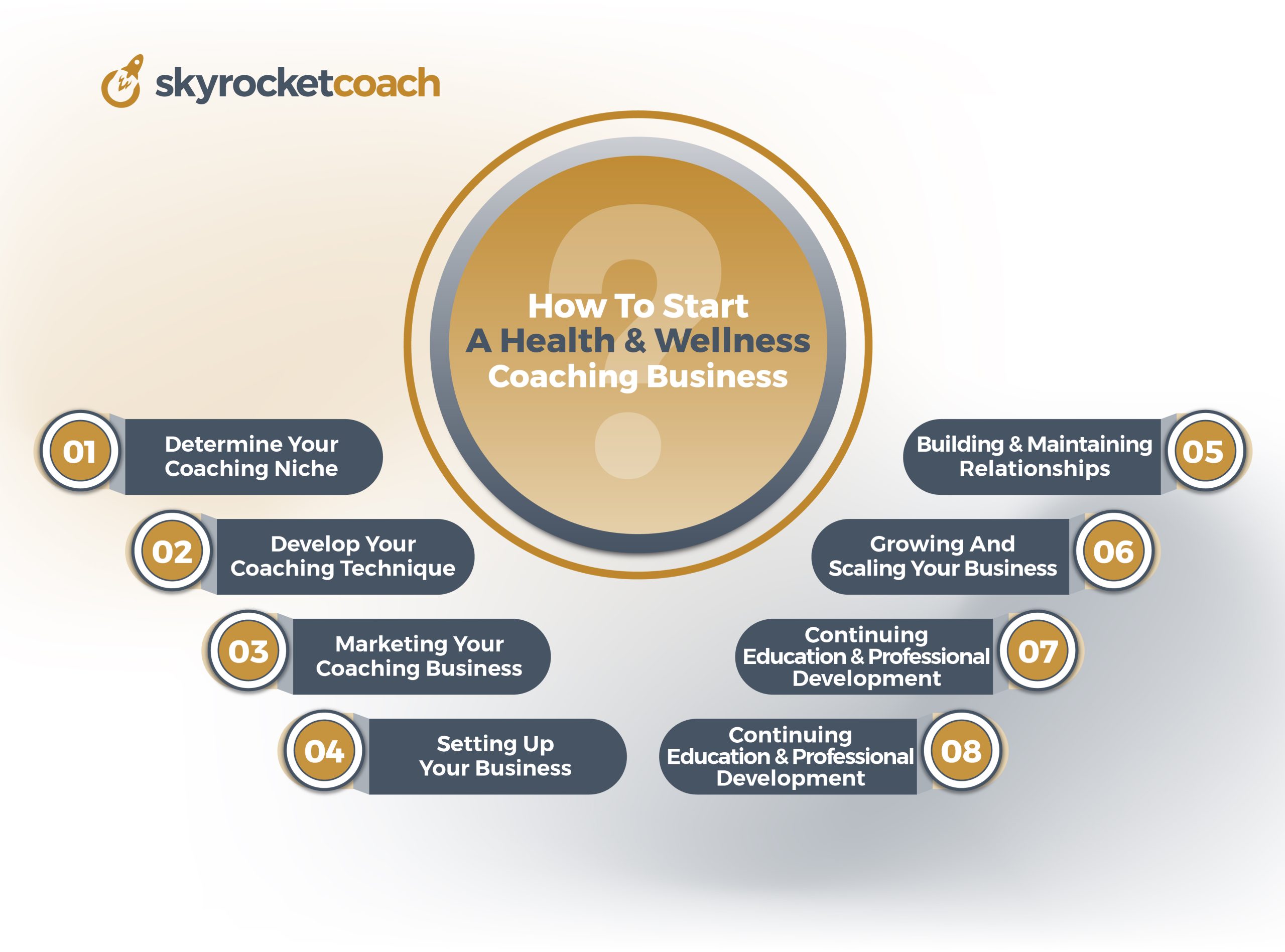Are you passionate about health and wellness? Do you dream of empowering others to achieve their health goals? Starting a health and wellness coaching business today is a fulfilling way to turn your passion into a career.
With the growing focus on personal health, there’s never been a better time to embark on this journey. This guide will walk you through each step, from the initial concept to launching your own coaching business.
Let’s get started on how to start a health and wellness coaching business today and achieve goals.
Table of Contents
Understanding Health And Wellness Coaching
Health and wellness coaching is a client-centered process that encourages individuals to explore and achieve personal health goals. As a coach, you’ll wear many hats: motivator, educator, and supporter. Unlike other forms of coaching, health and wellness coaching focuses specifically on health-related goals, whether it’s nutrition, exercise, stress management, or overall lifestyle changes.
The Importance Of Health And Wellness Coaching
Health and wellness coaching is crucial because it helps individuals set realistic goals and develop sustainable habits. A coach can help clients identify areas where they need to improve and provide them with the tools they need to succeed. Also, health and wellness coaches can inspire and encourage their clients, which is especially important for people who are worried or stressed about their health.
Benefits Of Starting A Health And Wellness Coaching Business
Starting a health and wellness coaching business can be incredibly rewarding.
Firstly, there is a high demand for health and wellness coaches, so there is plenty of opportunity to build a successful business.
Also, health and wellness coaches typically have a lot of flexibility in terms of scheduling and location. They can work with clients in person, over the phone or online, which means they can work from anywhere in the world.
Finally, starting a health and wellness coaching business allows you to make a positive impact on people’s lives, which is incredibly fulfilling.
How To Start A Health And Wellness Coaching Business?

-
Determine Your Coaching Niche
- Identifying Your Target Audience And Their Needs
To build a successful health and wellness coaching business, it is crucial to identify your target audience. This means understanding their specific needs and challenges, as well as their goals and objectives. Your target audience may include individuals who are looking to lose weight, manage stress, or improve their overall well-being. Once you understand their needs, you can tailor your coaching approach to meet their unique requirements.
- Defining Your Coaching Niche
You can define your coaching niche once you have identified your target audience. This means selecting a specific health and wellness coaching area you want to specialize in. For example, you may focus on nutrition, fitness, or stress management coaching. By defining your niche, you can position yourself as an expert in that field and differentiate yourself from other coaches.
When choosing your coaching niche, it is important to consider your skills and expertise, as well as the needs of your target audience. You may also want to research the market and competition to ensure that your niche is in demand. Once you have defined your coaching niche, you can start developing your coaching services and marketing your business to your target audience.
-
Develop Your Coaching Technique
- Coaching styles and methodologies
To be a successful health and wellness coach, it’s vital to develop your coaching technique. There are many styles and methodologies you can use, including cognitive-behavioral coaching, motivational interviewing, and positive psychology coaching. It is essential to choose a method that aligns with your niche and the needs of your target audience.
- Setting goals and creating plans
Once you have chosen your coaching style, it’s important to set goals and create plans. Goals should be SMART (specific, measurable, attainable, relevant, and time-bound) and based on your clients’ needs and desires. Creating a personalized plan for each client will help them achieve their goals in a timely and efficient manner.
Developing your coaching technique is an ongoing process, and it’s important to continue learning and refining your skills. Attend workshops, read books, and engage in continuing education to stay relevant and up-to-date. By developing a strong coaching technique, you will provide your clients with the tools they need to achieve their health and wellness goals, ensuring a successful coaching business.
-
Marketing Your Coaching Business
- Creating A Business Plan And Marketing Strategy
To build a successful coaching business, it’s important to create a robust business plan and marketing strategy. Start by defining your target audience and the unique value you offer to them. Develop a pricing structure that reflects your experience and expertise and set specific financial goals.
Your marketing strategy should include identifying your niche and creating a brand that reflects your coaching philosophy. Create a website, utilize social media platforms, and consider advertising on relevant blogs and websites to expand your reach.
- Networking and building your client base
Networking is an effective way to attract clients and build your coaching business. Attend events and conferences that your target audience is likely to attend. Offer free consultations or introductory sessions to showcase your skills and build trust with potential clients.
Word-of-mouth referrals are also crucial to building your client base. Satisfied clients are more likely to recommend your services to friends and family. Encourage referrals by offering a referral program or providing incentives for clients who bring in new business.
-
Setting Up Your Business
- Legal And Financial Considerations
When setting up a coaching business, legal and financial considerations are essential. It’s recommended to seek legal advice to register your business and obtain any necessary permits and licenses. Furthermore, obtaining liability insurance can protect your business from potential legal issues.
Financial planning is also critical to the success of your coaching business. Creating a cash flow forecast and budget can help you manage expenses and ensure you have enough revenue to sustain your practice. It’s also essential to track your income and expenses for tax.
- Tools And Resources For Managing Your Coaching Business
There are several tools and resources available to help manage your coaching business efficiently. A client management system can track client information, scheduling, and invoicing. Social media management tools, such as Hootsuite, can streamline your social media presence.
Moreover, creating a website using a platform like WordPress or Squarespace can establish your online presence. You can also offer online coaching services using video conferencing tools like Zoom or Skype.
-
Building And Maintaining Relationships
- Establishing Trust And Credibility With Clients
To establish trust and credibility with clients, a coach must listen, understand their needs and goals, and provide honest feedback. Building a rapport with clients can also help strengthen the relationship and increase their commitment to the coaching process. It’s suggested to set clear expectations and goals from the start and provide regular progress reports to ensure clients feel accountable and encouraged.
- Developing Long-Term Partnerships
To develop long-term partnerships with clients, a coach should prioritize communication and be responsive to their client’s needs. Providing added value, such as sending relevant articles or resources, can also demonstrate a coach’s dedication to their client’s success. It’s recommended to conduct regular check-ins to assess progress and adjust the coaching plan as necessary.
-
Growing And Scaling Your Business
- Expanding Your Offerings And Services
To grow and scale a coaching business, it’s essential to expand offerings and services. This can include creating new programs, developing online courses, or offering group coaching sessions. It’s also crucial to identify the target audience and adjust the business strategy accordingly. Providing high-quality content and consistently delivering value can help attract new clients and retain existing ones, leading to sustainable growth.
- Managing Growth And Scaling Challenges
As a coaching business grows, managing challenges related to scaling becomes important. This can include challenges in hiring a quality team, managing finances, and ensuring company culture remains intact. It’s recommended to establish efficient systems and processes and leverage technology to streamline operations. Developing a growth plan with clear milestones and KPIs can also provide a framework for managing growth and scaling effectively.
-
Continuing Education And Professional Development
- Staying Up-To-Date With Industry Advancements
To maintain relevance in the constantly evolving coaching industry, it’s vital to stay up-to-date with industry trends and advancements. This can involve attending conferences, reading industry publications, and following thought leaders in the field. Meanwhile, obtaining feedback from clients and peers can provide valuable insights into areas where a coach may need to improve their skills or knowledge.
- Continuing Education Options For Health Coaches
Health coaches can pursue a variety of continuing education options to maintain and enhance their skills. This includes obtaining additional certifications, specialized training in a specific area, or pursuing a degree in a related field. Online courses and webinars are also available to allow for flexible learning opportunities.
Continuing education can not only enhance a coach’s knowledge and skills but can also improve their credibility and attract new clients. It demonstrates a commitment to providing high-quality services and staying up-to-date with industry advancements.
-
Continuing Education And Professional Development
- Staying Up-To-Date With Industry Advancements
Health and wellness coaches need to keep themselves updated with the constantly evolving coaching industry. They should attend conferences, read industry publications, and follow thought leaders in their field. Getting feedback from clients and peers can also provide insights for improving skills.
- Continuing Education Options For Health Coaches
Health coaches can pursue additional certifications, specialized training in a specific area or pursue a degree in a related field to enhance their skills and knowledge. Online courses and webinars are also available for flexible learning opportunities. New clients can see a coach’s commitment to offering high-quality services and improved credibility through continuing education.
How To Start A Health And Wellness Coaching Business Online?
Starting a health and wellness coaching business online is an exciting endeavor. To begin, follow these steps:
- Get Certified: Obtain a reputable health coaching certification to build your credibility and expertise.
- Niche Selection: Identify your coaching niche based on your passion and expertise, whether it’s weight loss, nutrition, stress management, or holistic wellness.
- Business Plan: Create a detailed business plan outlining your services, target audience, and marketing strategies.
- Online Presence: Build a professional website, establish social media profiles, and optimize them for search engines.
- Virtual Tools: Invest in virtual coaching tools and management platforms for client sessions.

- Marketing: Utilize digital marketing, content creation, and social media to attract and engage clients.
- Legalities: Ensure you have the necessary licenses, insurance, and a code of ethics in place.
- Client Acquisition: Network, offer free webinars, and provide valuable content to attract your first clients.
- Continuous Learning: Stay updated with the latest health trends and coaching techniques through ongoing education.
- Scaling Up: As your business grows, consider offering group coaching, online courses, or specialized programs to expand your reach and impact.
How To Start A Health And Wellness Coaching Business From Home?
Starting a health and wellness coaching business from home is a rewarding venture offering flexibility and convenience. Begin by acquiring the necessary certification and creating a dedicated workspace within your home. Invest in digital tools and resources to facilitate virtual coaching sessions and maintain a professional online presence through a well-designed website. Ensure you address legal and ethical considerations, obtaining any required licenses and prioritizing client privacy. To attract clients, utilize online marketing strategies, build a network within the industry, and consider offering webinars or workshops. As your business grows, focus on continuous learning and expanding your reach to positively impact clients’ well-being from the comfort of your home.
Health Coaching Business Plan Template
A robust business plan is crucial. Use a health coaching business plan template to outline your business strategy, financial projections, and marketing plans.

Final Thoughts On How To Start A Health And Wellness Coaching Business
Launching a health and wellness coaching business can be challenging, but it can also be highly rewarding for both the coach and their clients. Health coaches should focus on building a business plan, defining their niche, establishing a pricing strategy, and implementing marketing tactics.
It’s important for coaches to stay up-to-date with industry advancements and invest in continuing education to remain credible and provide high-quality services.
Moreover, if you’re looking for expert guidance and support on your path to becoming a successful health and wellness coach, consider partnering with Skyrocket Coach. It’s a leading company in the coaching industry, known for its commitment to helping aspiring coaches launch and grow their businesses.
Now is the time to take that first step towards a fulfilling health and wellness coaching career.
Frequently Asked Questions About How To Start A Health And Wellness Coaching Business
Q: Do I need to be certified to become a health coach?
A: While certification is not legally required, it can improve credibility and demonstrate a commitment to providing high-quality services.
Q: How much can I charge for health coaching?
A: The pricing strategy varies depending on the coach’s experience, location, and services offered. Researching the market and competitors can help in determining a pricing structure.
Q: What qualifications do I need to become a health and wellness coach?
Answer: Most coaches start with a health coach certification from a reputable organization. Continuous education in specific health areas enhances your coaching skills and expertise, increasing your appeal to potential clients.
Q: What are some effective strategies for client acquisition in health coaching?
A: Effective strategies include networking, social media marketing, hosting workshops, public speaking, and offering referral incentives to existing clients. Building a strong online presence also attracts potential clients.




Recent Comments